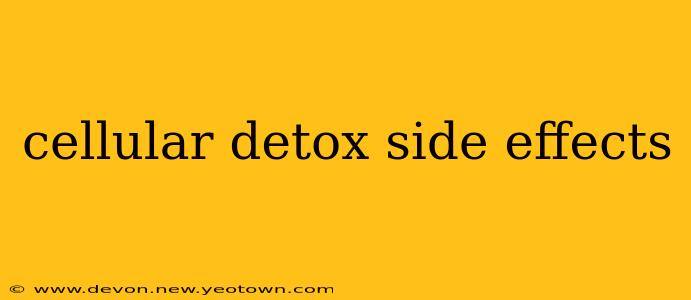The human body is a remarkable machine, constantly working to maintain balance and eliminate toxins. But what happens when we try to accelerate this process with a cellular detox? While the idea of cleansing your system sounds appealing, it’s crucial to understand that cellular detox isn't a universally recognized medical term, and the potential side effects depend heavily on the specific methods employed. There's no single "cellular detox" – it's an umbrella term for various practices, some scientifically supported and others more fringe. Let's delve into the potential side effects and explore some common approaches.
What is a Cellular Detox?
Before discussing side effects, let's clarify what's often meant by "cellular detox." It generally refers to methods aiming to remove toxins from the body's cells. These methods can range from dietary changes and increased water intake to more intensive approaches like colon cleanses or intravenous chelation therapy. The premise is that these practices support the body's natural detoxification processes, improving overall health and well-being.
However, it's important to note that the body already has sophisticated systems in place – the liver, kidneys, and lymphatic system – designed to eliminate waste products and toxins. While supporting these systems through a healthy lifestyle is crucial, the need for aggressive "detox" methods is often overstated.
Common "Cellular Detox" Methods and Their Potential Side Effects
Many approaches fall under the "cellular detox" umbrella. Let's examine some, along with potential drawbacks:
1. Dietary Changes (Fasting, Juicing, Specific Diets):
Many people associate cellular detox with dietary changes like fasting, juicing, or following specific detox diets. While these can have benefits, such as weight loss and improved gut health, they can also lead to:
- Headaches and fatigue: Restricting calories or eliminating certain food groups can trigger headaches and fatigue.
- Nutrient deficiencies: Restrictive diets can lead to nutrient deficiencies if not carefully planned.
- Muscle loss: Prolonged fasting or very low-calorie diets can lead to muscle loss.
- Electrolyte imbalances: Severe restrictions can disrupt electrolyte balance, leading to heart palpitations or other problems.
Important Note: Always consult with a healthcare professional or registered dietitian before making significant dietary changes, especially if you have pre-existing health conditions.
2. Colon Cleanses:
Colon cleanses are often marketed as a way to remove toxins from the colon. However, there's limited scientific evidence to support their effectiveness and they can cause:
- Dehydration: Many colon cleanses involve significant fluid loss, leading to dehydration.
- Electrolyte imbalances: Similar to restrictive diets, colon cleanses can disrupt electrolyte balance.
- Diarrhea and cramping: These are common side effects of colon cleanses.
- Intestinal perforation (rare but serious): This is a very serious, though rare, complication.
3. Herbal Supplements and Teas:
Certain herbal supplements and teas are promoted as detoxifiers. However:
- Interactions with medications: Herbal supplements can interact with medications, potentially causing harmful effects.
- Liver damage (rare but possible): Some herbal remedies can damage the liver, particularly when taken in large doses or over extended periods.
- Allergic reactions: Allergic reactions to herbal supplements are possible.
4. Chelation Therapy:
Chelation therapy is a medically supervised procedure involving intravenous administration of chelating agents to remove heavy metals from the body. While used to treat heavy metal poisoning, it's not generally recommended for general "detox" purposes and can have side effects like:
- Kidney problems: Chelating agents are excreted through the kidneys, potentially causing kidney damage.
- Low blood pressure: A drop in blood pressure is a possible side effect.
- Nausea and vomiting: These are common side effects.
Are Cellular Detox Methods Necessary?
The human body is equipped with robust detoxification systems. A healthy lifestyle focusing on a balanced diet, regular exercise, sufficient sleep, and stress management is typically sufficient to support these systems. Claims that aggressive "cellular detox" methods are necessary for good health often lack scientific backing.
When to Seek Professional Medical Advice:
If you're experiencing any concerning symptoms after starting a cellular detox program, consult a healthcare professional immediately. They can help determine the cause of your symptoms and ensure proper medical management.
Remember, before embarking on any cellular detox program, it's critical to consult a healthcare professional. They can assess your individual health needs, discuss the risks and benefits of various approaches, and help you make informed decisions that support your well-being. Don't let the allure of quick fixes compromise your health. A holistic approach to wellness, focusing on sustainable healthy habits, is always the best long-term strategy.

